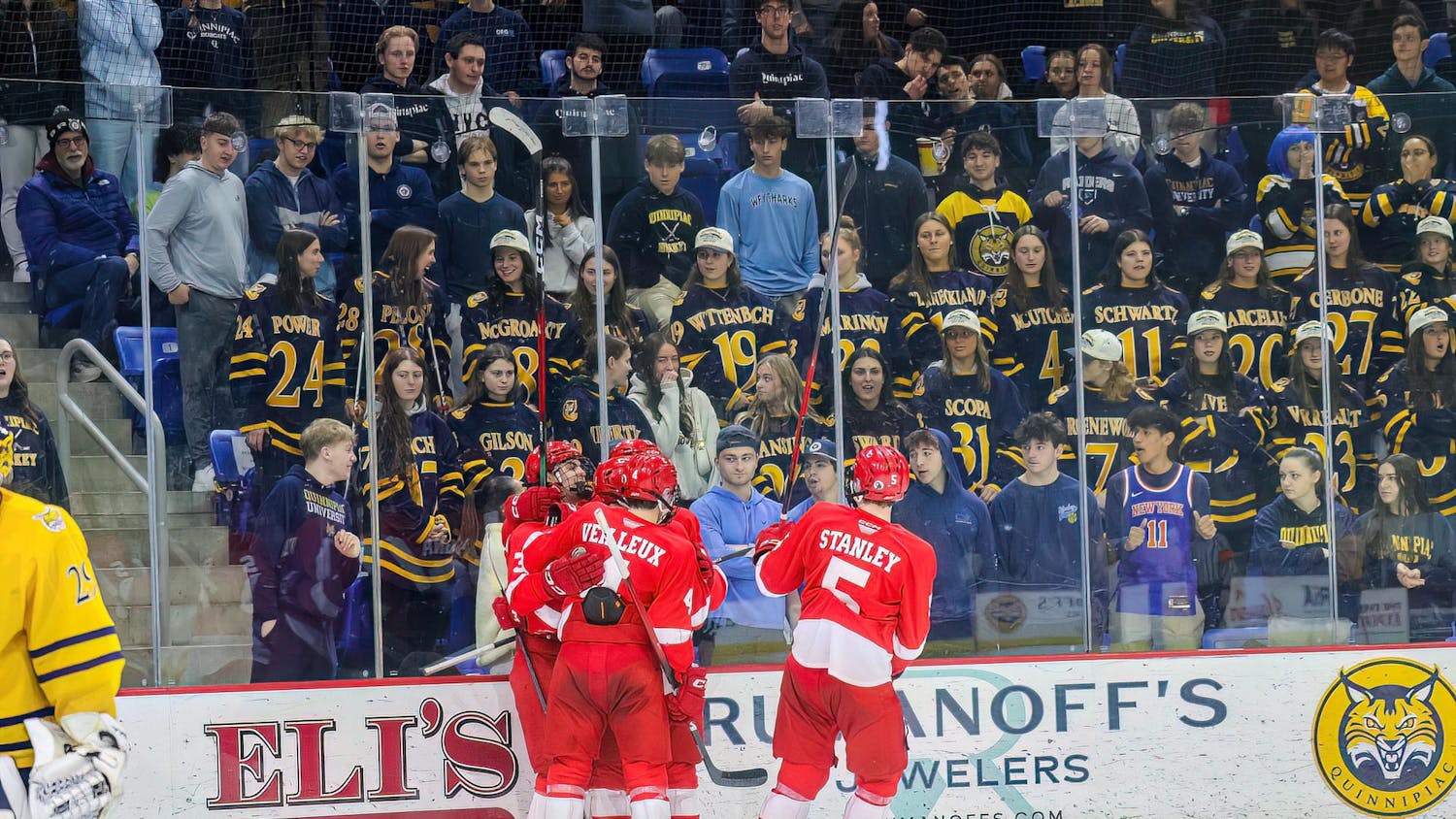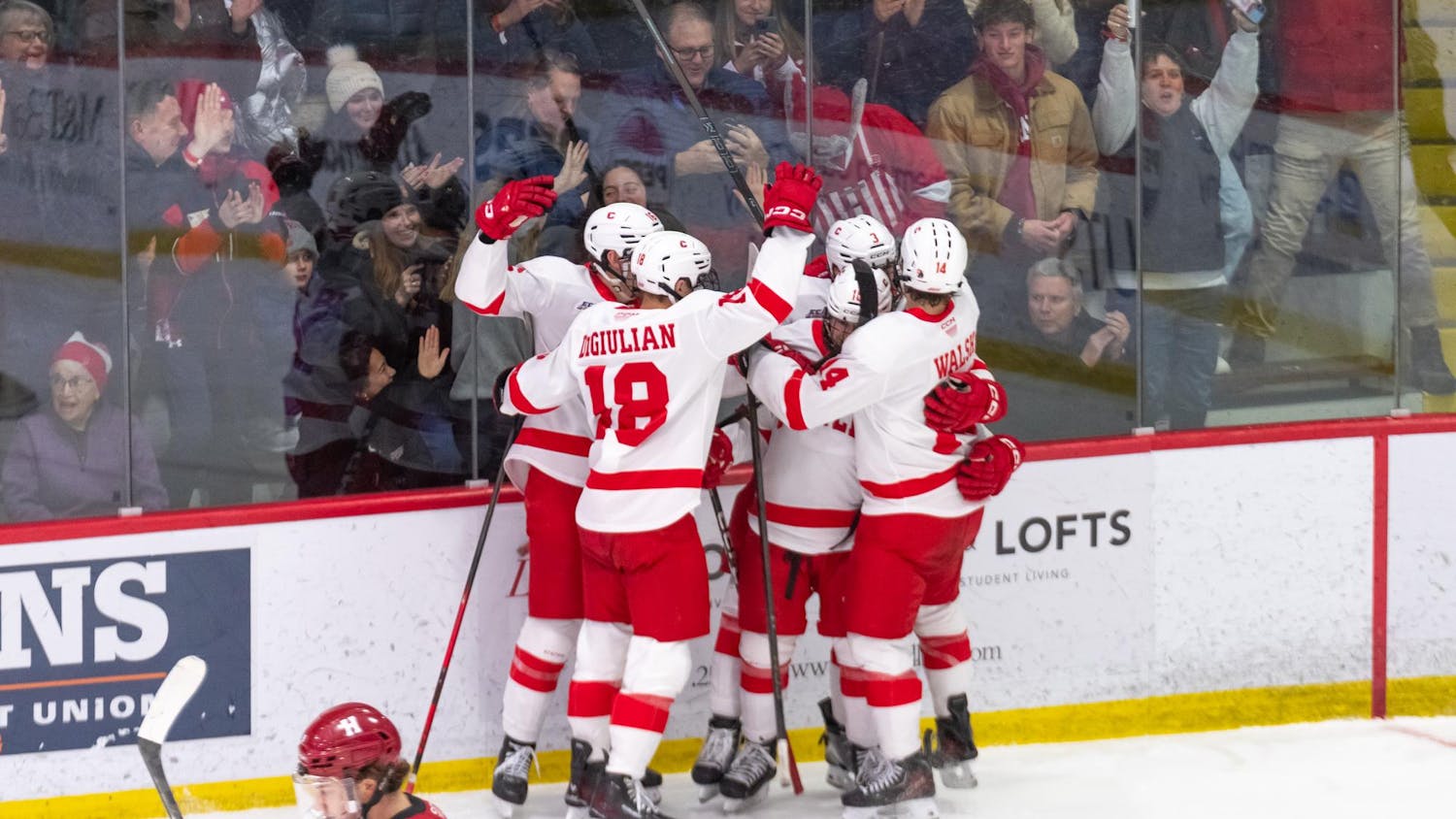This story is part of The Sun’s 2018 NCAA Hockey supplement. To view the rest of the supplement, click here.
The northeast region’s top seed Cornell men’s hockey is two wins away from its first Frozen Four since 2003. The first foe standing in its way is its most storied rival. Despite dominating the ECAC regular season to earn the top seed in the conference tournament, No. 4/3 Cornell faltered in the league semifinals against a red-hot Princeton team that found its way into the NCAA tournament with a conference championship. Now, it clashes with a No. 13 Boston University team fresh off a playoff push and Hockey East championship, in what promises to be an intense, physical matchup. “Our intensity and our [competition] level is going to have to be the best,” said junior forward and captain Mitch Vanderlaan. “That’s something that we’ve prided ourselves on all year.” A year after losing 5-0 to a different Massachusetts foe in the first round a year ago, the Red — armed with 10 freshmen who didn’t experience the loss to UMass-Lowell — is primed to do some damage in the tournament this season. “I think last year everyone was just excited to be there, but this year we have higher goals for sure and we’re not just there to play a game or anything, we’re there to make it to the Frozen Four,” said sophomore defenseman Yanni Kaldis. Head coach Mike Schafer ’86 is confident his young team will be ready to go this time around. “We’re going for it,” Schafer said. “We’re not going to test the waters and see what it’s like this year, we’re all in in the sense of going down there and going right after it.” The Red and Terriers last met in November, when Cornell earned a 4-3 Red Hot Hockey win at Madison Square Garden in New York. The old foes have a rich history but haven’t met in the NCAA tournament since the 1972 national championship game — a 4-0 Terrier win. Schafer said facing off against an opponent his team has already seen this season can be an advantage — but it’s a benefit for both sides. “Our guys know what [B.U. is] like, the pace of it; they know their better players,” Schafer said. “They have a real good feel for what their strengths are, what their weakness are, how we need to play, things we didn’t do well when we did play against them and things we were able to capitalize on.” The resurgent Terriers found their way into the tournament by winning the Hockey East, beating two top-15 teams to earn a fourth straight trip to the NCAA tournament. “They’ve got some of the top players in the country,” Schafer said of B.U. “You just kind of go down the lineup, [their] top nine forwards are as good as anybody in the country. So we’ll have our hands full, but we knew that against any team we were going to play.” B.U., 6-0-1 in their last seven contests, downed Boston College in the semifinals with a 4-3 overtime victory before earning a 2-0 win over Providence in the conference final. Cornell, despite being the top seed in the region, isn’t entering the tournament on a roll. But Kaldis said his team expects to be a force to be reckoned with on the season’s biggest stage. “We are the No. 1 seed so I think we should be playing with a lot of confidence going in there expecting to win, because we have a team that’s good enough to make it to the Frozen Four without a doubt,” he said. “I think there is a bit of a sense of urgency here because I don’t think we’ve accomplished as much as we should [have] this year, especially looking at what happened last weekend.” Matched up against one of the best top lines in the country for the second straight week, the Red knows all of its 18 skaters will play a role in shutting down six-foot-five Jordan Greenway, who has 33 points, and the Terriers’ top line. The Terriers score an average of 3.11 goals per game, 15th-best in the country. Junior Bobo Carpenter is tied with his classmate Greenway with 33 points for most on the team. “Last time we played them, it really took me by surprise as a coach how much [B.U. coach David Quinn] plays [the top line],” Schafer said. “He plays them after every TV timeout, a lot of times they play 11 forwards and seven [defenders] so for us it’s not going to be one line against them, it’ll be a couple different lines against them.” Schafer said his squad can look to its game in New York as a blueprint for success against B.U.’s best playmakers. “The strength of their team is they’re really strong down low, at the hashmarks, bringing pucks to the net and they’re good in transition,” Schafer said. “We got to play fast, catch them maybe stepping up in the neutral zone, get up and play physical ourselves and create the types of turnovers we did [at] Madison Square Garden.” Despite the tough nature of games this late in the season, Schafer said his team will leave it all on the ice. “We’re not going to have any regrets about how hard we played, not going to sit back and go ‘jeez, we came down, we were tentative in the game,’” Schafer said. “There’s not going to be any of that for our hockey team.” “There’s definitely that edge to be ready and to make sure that this is the one chance we really have to go after it,” Vanderlaan said. The game is set for 1 p.m. Saturday, and the winner will advance to the regional final Sunday at 4 p.m. to take on the winner between Michigan and Northeastern. Both games will be at the DCU Center in Worcester, Massachusetts.Read More











